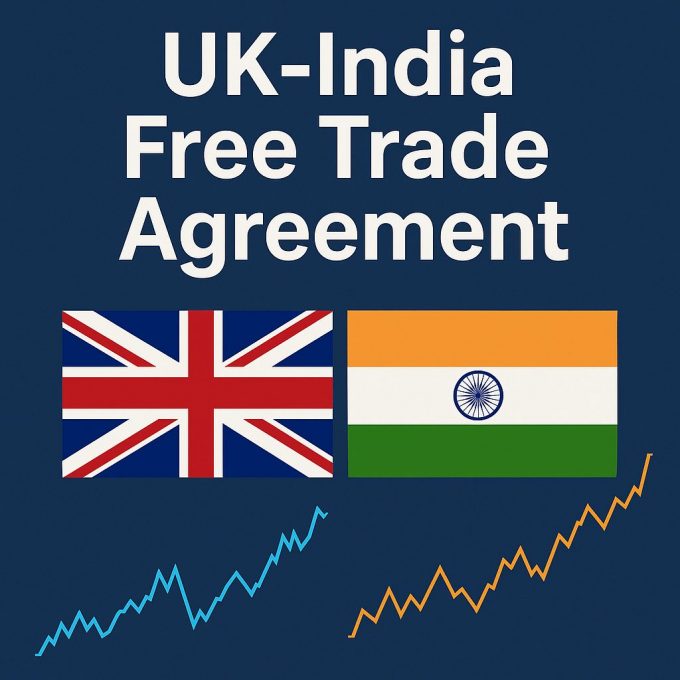Most significant post Brexit trade pact
The UK-India Free Trade Agreement (FTA), finalised in 2025 after years of negotiation, marks the most significant post-Brexit trade pact for the United Kingdom. It not only strengthens economic ties with one of the world’s fastest-growing economies but is also poised to influence key sectors across both UK and Indian stock markets. Here’s how the deal reshapes trade dynamics and creates fresh investment opportunities.
What’s in the UK-India trade deal?
The free trade agreement aims to reduce or eliminate barriers to trade between the UK and India, supporting goods, services, and capital flows. Key elements include:
Tariff reductions on UK exports
- 90% of British goods will benefit from tariff cuts.
- Whisky tariffs to drop from 150% to 40% over 10 years.
- Car import duties slashed from over 100% to 10%.
Duty-free access for Indian exports
- 99% of Indian exports such as textiles, food products, and jewellery will gain duty-free entry to the UK market.
Projected economic impact
- Expected to boost UK-India bilateral trade by £25.5bn annually by 2040.
- Could increase UK GDP by £4.8bn over the next 15 years.
- Strengthens UK’s strategic trade position in Asia post-Brexit.
Impact on UK stocks and investment markets
Beneficiaries in the UK market
- Whisky producers like Diageo (LSE: DGE) may experience a surge in exports due to lower tariffs in India.
- Automotive giants (e.g., Jaguar Land Rover, owned by India’s Tata Group) stand to benefit from easier access and improved pricing competitiveness.
- Aerospace and manufacturing firms could gain new contracts as cross-border trade accelerates.
Stock market reaction
- The largest UK stocks remains bullish, underpinned by optimism around increased trade flows and a more diversified export base.
- Analysts see upside potential in export-driven UK investment trusts, particularly those focused on India or emerging markets.
Impact on Indian stocks and key sectors
Winners in the Indian market
- Tata Motors, Eicher Motors, and TVS Motor Company could gain market share and expand their UK footprint.
- Textile exporters and pharmaceutical firms will benefit from frictionless access to UK consumers.
- The Nifty Auto Index has shown positive sentiment, with leading automotive stocks trending upward.
Boost for Indian equities
- Increased foreign demand and trade predictability could drive foreign institutional investment (FII) into Indian equities.
- Export-focused companies are likely to see margin improvement due to tariff elimination and increased volume.
Conclusion: Why this trade deal matters for investors
The 2025 UK-India Free Trade Agreement is more than just a diplomatic milestone—it’s the first tangible boost for companies on both sides. It should unlock growth for key sectors, provides tailwinds for publicly traded companies, and enhances the investment outlook for listed investment trusts investing on UK export businesses and Indian equity markets alike. Lets hope this triggers some optimism for UK equities at these low valuations! However, geopolitical considerations—such as ongoing tensions between India and Pakistan—may continue to cast occasional uncertainty over the region, reminding investors of the importance of geopolitical risk management in emerging market strategies.
For peer group comparisons of Indian focused funds and UK focused funds
